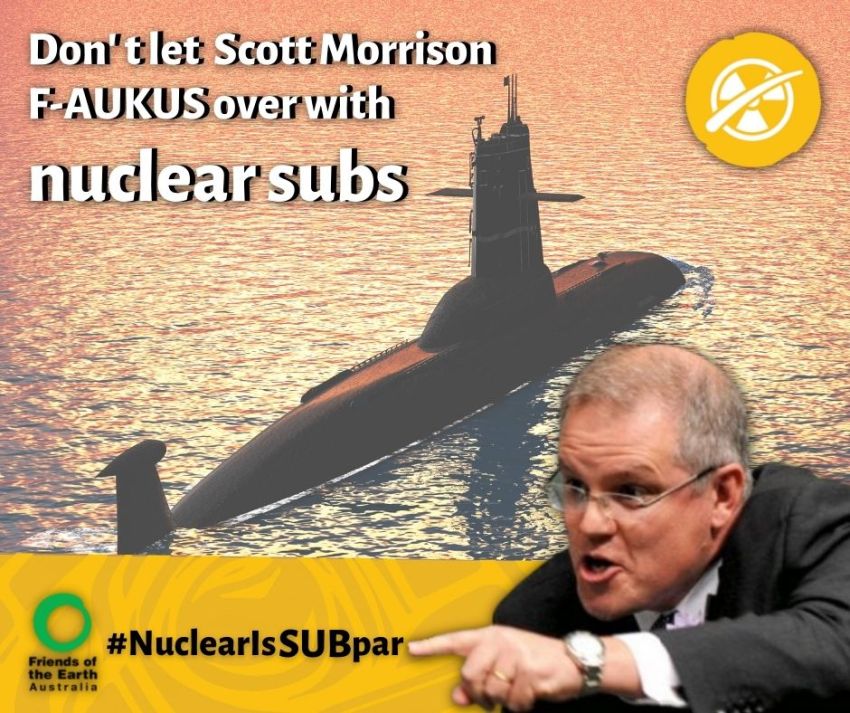
A coalition of activists is challenging the federal government’s embrace of nuclear-submarine technology and the new AUKUS agreement.
AUKUS is a war pact directed at China. It will mean up to 3000 more United States troops stationed here. The US will be able to store war materials including fuel, munitions, spare parts, armoured vehicles, tanks and possibly missiles in the Northern Territory.
US warships will have unimpeded access to ports. US military aircraft including B1 bombers, which can carry nuclear weapons, will have unrestricted access to runways.
AUKUS makes Australia an enemy of whoever is an enemy of the US, and therefore makes us less safe. AUKUS locks the country into the US’ foreign policy and war plans.
The nuclear-powered submarine plan could also be a Trojan horse for a nuclear industry to be set up.
The US/British nuclear-powered submarines use highly enriched, nuclear-weapons-grade uranium, making them dangerous floating nuclear bombs, should an accident occur.
Nuclear-powered submarines are designed for offensive operations in oceans distant from our shores, rather than for self-defence operations in relatively shallow Australian shores for which the French diesel-electric submarines were more suited.
The AUKUS war pact and the nuclear-powered submarines will promote a military build-up.
The decision to support AUKUS and the nuclear submarines was undemocratic, made without even a parliamentary debate or vote. The decision to blindside the French and drop the submarine contract shows up Australia as an unreliable partner in international contracts.
The media, in general, has applauded the decisions which, it claims protect us from “security threats”. It has been left to the independent media such as Green Left to analyse and warn of the dangers.
There are other voices raising their concerns loud and clear.
Independent and Peaceful Australia Network (IPAN) and Australian Anti-Bases Campaign Coalition called a meeting on September 18, two days after AUKUS was announced, that attracted more than 100 participants. It led to a statement which said in part that “Australia cannot become a staging point for the US military; we cannot abrogate our sovereignty to the US; we cannot encourage nuclear proliferation and risk environmental catastrophe”.
A petition, “No Nuclear-Submarines; End US dominance; Healthcare not warfare,” called on the government to withdraw from AUKUS and stop the plan to acquire nuclear-powered submarine attracted more than 22,736 signatories, as at October 9.
The Maritime Union of Australia has spoken out, as has the Electrical Trades Union, Friends of the Earth Australia and the National Tertiary Education Union.
The Campaign for International Co-operation and Disarmament condemned the government for “not acting in our name”. It said the agreement “only draw[s] Australia into another US war”.
The Medical Association for Prevention of War said AUKUS represents “a threat to human health and global security”. The Australian Conservation Foundation called for Australia to be nuclear-free. Pax Christi Australia, a branch of the international Christian Peace Movement, said it would not help the cause of “building peace in our region”.
The New Zealand Labour government reiterated its anti-nuclear policy, and said it would not allow any Australian nuclear submarines to enter its waters or ports. The International Affairs and Disarmament Committee of the Aotearoa/New Zealand Peace Foundation welcomed this.
Kiribati President Taneti Maamau said the nuclear-submarine deal puts the Pacific region at risk. Between 1957 and 1962, Britain and the US launched more than 30 nuclear tests in the Pacific Islands.
“Our people were victims of nuclear testing … we still have trauma … with that in mind, with anything to do with nuclear, we thought it would be a courtesy to raise it, to discuss it with your neighbours,” Maamau said.
Malaysian Prime Minister Ismail Sabri Yaakob warned that the AUKUS program could spark an arms race in the region and said he has raised his concerns with Prime Minister Scott Morrison.
[A meeting to form a national coalition to oppose AUKUS will be held on November 7 at 2pm.]